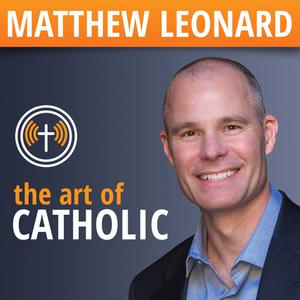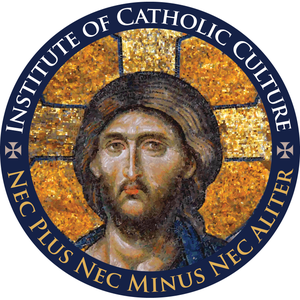
Deep in Scripture Radio
Marcus Grodi
A scripture study Podcast hosted by Marcus Grodi
- 41 minutes 56 secondsA Post-Thanksgiving Reflection - Marcus Grodi
For last week's special Thanksgiving episode, Marcus Grodi shared a portion of a sermon he gave as part of a Thanksgiving service back when he was a Presbyterian pastor in 1985. That message focused on Philippians 4:4-7, in which St. Paul calls us to present our requests to God with gratitude already in our hearts.
Marcus follows up this week by focusing on the verses that immediately follow that passage. In Philippians 4:8-9, St. Paul gives us a template of how to guard our hearts and mind from the world, the flesh and the devil, which bombard us with temptations of every kind. Rather than fall to those temptations, Paul offers us this challenge:
"Finally, brethren, whatever is true, whatever is honorable, whatever is just, whatever is pure, whatever is lovely, whatever is gracious, if there is any excellence, if there is anything worthy of praise, think about these things. What you have learned and received and heard and seen in me, do; and the God of peace will be with you."
For more episodes of Deep in Scripture, visit www.deepinscripture.com
10 December 2020, 9:01 pm - 25 minutes 58 secondsMarcus Grodi Reflects on a Thanksgiving Sermon He Preached in 1985
In a special Thanksgiving edition of Deep in Scripture, Marcus Grodi shares audio from a sermon he preached on the Sunday before Thanksgiving in 1985, when he was still a Presbyterian pastor in central Ohio.
The text for that sermon came from Philippians 4:6, where St. Paul exhorts his readers to "have no anxiety about anything, but in everything, by prayer and supplication, with thanksgiving, let your requests be made known to God."
In 1985, as a Presbyterian pastor, Marcus preached on the need to present our prayers with thanksgiving, because we know that God is trustworthy.
On this episode, Marcus reflects on that same passage with the benefit of 35 years of hindsight, to share how his understanding of this passage from St. Paul has deepened over time.24 November 2020, 8:07 pm - 1 hour 6 minutesSt. Cyprian of Carthage and Perseverance to the End - Marcus and JonMarc Grodi
Marcus and JonMarc Grodi wrap up their study of St. Cyprian of Carthage's treatise on the Lord's Prayer, specifically looking at the implications of what it means to ask for God's will to be done in our lives.
The last points that St. Cyprian makes in this passage have to do with following God's will, even under the threat of persecution. God calls us to faithfulness despite our circumstances, which St. Cyprian had the courage to follow all the way to his martyrdom by beheading in 258AD.16 October 2020, 5:26 pm - 39 minutes 2 secondsSt. Cyprian of Carthage on Preferring Nothing to Christ - Marcus and JonMarc Grodi
Marcus and JonMarc Grodi continue their series looking at St. Cyprian of Carthage's treatise on the Lord's Prayer, specifically focusing on St. Cyprian's thoughts regarding the will of God.
St. Cyprian tells us to "prefer nothing whatever to Christ, because He did not prefer anything to us." Jesus held nothing back in His incarnation, passion, death, and resurrection; our call as Christians is to give everything of ourselves back to Him in return.
16 October 2020, 5:09 pm - 1 hour 2 minutesSt. Cyprian of Carthage and the Fear of the Lord - Marcus and JonMarc Grodi
Marcus and JonMarc Grodi continue their study of St. Cyprian of Carthage's treatise on the Lord's Prayer by diving even deeper into what it means to ask for God's will to be done in our lives.
What exactly does the fear of the Lord mean, properly understood? What are its implications in regard to our humility, our wonder, our worship, and our obedience? If, as Proverbs 9:10 tells us, "the fear of the Lord is the beginning of wisdom," then how do we enter into that mystery?16 October 2020, 4:56 pm - 31 minutes 19 secondsSt. Cyprian of Carthage on Love of God and Neighbor - Marcus and JonMarc Grodi
As Marcus and JonMarc Grodi continue their study of St. Cyprian of Carthage's remarks on the Lord's Prayer, they look at what he has to say about love of God and neighbor.
St. Cyprian speaks of the need "to love God with all one's heart; to love Him in that He is a Father; (and) to fear Him in that He is God," but what is that supposed to look like in our everyday lives? Marcus and JonMarc explore what St. Cyprian says about this challenging aspect of what it means to live in God's will.
16 October 2020, 4:31 pm - 42 minutes 25 secondsSt. Cyprian of Carthage on Willingness to Suffer - Marcus and JonMarc Grodi
Marcus and JonMarc Grodi continue their series on St. Cyprian of Carthage's treatise on the Lord's Prayer by looking at one of the most difficult aspects of what it means to pray the seemingly simple phrase, "thy will be done."
It can be manageable to live that principle when it comes to obeying directives from God, or changing negative behaviors; but what are we supposed to do when it comes to applying that principle to accepting the harm that others intend for us? Are we supposed to be doormats, or should we demand justice? Where is the balance?
In this episode, Marcus and JonMarc explore the mystery of suffering, humility and the Will of God, and look at how submission to God's will means not that we're called to solve a problem, but rather enter into a mystery.
16 October 2020, 4:16 pm - 29 minutes 7 secondsSt. Cyprian of Carthage on Moral Discipline - Marcus and JonMarc Grodi
As Marcus and JonMarc make their way through St. Cyprian of Carthage's treatise on the Lord's Prayer, they look at what he has to say about the importance of maintaining control over our bodily passions.
As human beings, what we do with our bodies has implications for our souls. St. Cyprian reminds us that our bodies express the disposition of our souls when it comes to lust, gluttony and sloth, but also in regard to faith, hope and charity.16 October 2020, 3:46 pm - 29 minutes 30 secondsSt. Cyprian of Carthage on Justice and Mercy – Marcus and JonMarc Grodi
Marcus and JonMarc Grodi continue their study of St. Cyprian of Carthage’s treatise on the Lord’s Prayer, this time around focusing on what St. Cyprian has to say about the relationship between justice and mercy.
To focus on justice to the exclusion of mercy leads to legalism; to focus on mercy to the exclusion of justice leads to license. St. Cyprian reminds us that in order to balance these goods, we must seek to do the will of God, who is both infinitely just, and infinitely merciful.
16 October 2020, 3:23 pm - 28 minutes 22 secondsSt. Cyprian of Carthage on Prudence and Self Control - Marcus and JonMarc Grodi
Marcus and JonMarc Grodi continue their study of St. Cyprian of Carthage’s treatise on the Lord’s Prayer, they look at the way St. Cyprian talks about moderation and self control in the spiritual life.
What is the relationship between our will and our passions? How do we avoid the complacency that leads us to let our guard down in regard to sin? How do we tame the tongue? Marcus and JonMarc dig into what St. Cyprian has to say about employing the virtue of prudence in our walk as Christians.
16 October 2020, 3:08 pm - 1 hour 20 minutesSt. Cyprian of Carthage on Humility in the Lord's Prayer - Marcus and JonMarc Grodi
In this episode of Deep in Scripture, Marcus and JonMarc Grodi continue to look at St. Cyprian of Carthage's treatise on the Lord's Prayer. This time around, they look at the way that the "Our Father" calls us to have the humility to conform our will to the will of God, and Marcus specifically discusses how he understands this concept differently now as a Catholic than he did in his years as a Presbyterian pastor.
16 October 2020, 2:54 pm - More Episodes? Get the App
Your feedback is valuable to us. Should you encounter any bugs, glitches, lack of functionality or other problems, please email us on [email protected] or join Moon.FM Telegram Group where you can talk directly to the dev team who are happy to answer any queries.
 The Art of Catholic with Matthew Leonard
The Art of Catholic with Matthew Leonard
 Called to Communion
Called to Communion
 Jimmy Akin Podcast
Jimmy Akin Podcast
 Letters From Home
Letters From Home
 Institute of Catholic Culture
Institute of Catholic Culture
 Catholic Answers Focus
Catholic Answers Focus